Tara Chevrestt's Blog, page 61
April 7, 2014
Cover Art Reveal: What the Lady Wants by Renee Rosen
In late 19th century Chicago, visionary retail tycoon Marshall Field made his fortune wooing women customers with his famous motto:“Give the lady what she wants.”
His legendary charm also won the heart of socialite Delia Spencer, and led to an infamous love affair.
The night of the Great Fire, as seventeen-year-old Delia watched the flames rise and consume what had been the pioneer town of Chicago, she couldn’t imagine how much her life, her city, and her whole world was about to change. Nor would she have guessed that the agent of that change would not simply be the fire, but more so the man she met that night…
Leading the way in rebuilding after the fire, Marshall Field reopens his well-known dry goods store and transforms it into something the world has never seen before: a glamorous palace of a department store. He and his powerhouse coterie— including Potter Palmer and George Pullman—usher in the age of robber barons, the American royalty of their generation.
But behind the opulence, their private lives are riddled with scandal and heartbreak. Delia and Marshall first turn to each other out of loneliness, but as their love deepens, they will stand together despite disgrace and ostracism, through an age of devastation and opportunity, when an adolescent Chicago was transformed into the Gleaming White City of the Chicago’s World’s Fair of 1893.
Praise for Dollface
“Intoxicating....Fans of Boardwalk Empire will love Dollface.”—New York Times Bestselling Author Sara Gruen
“A lively, gutsy romp of a novel that will keep you turning pages.”—Karen Abbott, New York Times Bestselling Author of Sin in the Second City
And now the new cover....
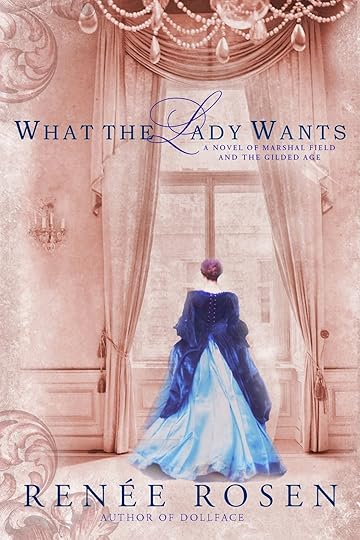
Preorder HERE
This book will be release this year.
Published on April 07, 2014 00:00
April 6, 2014
Interpreting The Case of Anna O. Through Guises of Desire by Hilda Reilly
I encountered author Hilda Reilly on Goodreads. When I took a look at what she had written, I was most drawn to Guises of Desire, a novel from the perspective of Bertha Pappenheim.
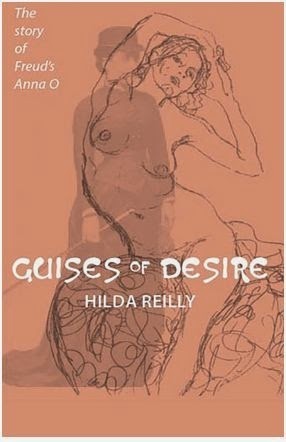
Pappenheim is best known as "Anna O.", the name Dr. Josef Breuer used to protect her identity. Needless to say, it's now an open secret. Before reading Reilly's novel, I had read The Story of Anna O. by Lucy Freeman which is now out of print. Anna O. was the first to use "the talking cure" which is now known to us as psychoanalysis. Although Sigmund Freud is often thought to be the Father of Psychoanalysis, it was actually Breuer who originated the practice. Breuer's ideas about Anna O. appear in Studies on Hysteria which is a collection of cases co-written by Freud and Breuer. The link I have provided will lead readers to the full text version on the Internet Archive. There you can see for yourself what Breuer had to say about Pappenheim.
Although Breuer was sympathetic and compassionate, he never truly understood Pappenheim. Yet he was the only supportive figure in her life. This resulted in the first case of the phenomenon known as transference which psychoanalysis interprets in terms of its view of family dynamics, but I think that Pappenheim's psychological dependence on Breuer is a much more believable explanation.
Breuer abandoned treatment of Pappenheim because he regarded her as incurable, but she went on to become an activist for the protection of trafficked women. As a member of the Jewish community of Vienna, she was also active on the behalf of Jewish women in crisis. I consider her an important feminist figure. In an essay that appears on The Jewish Women's Archive , Marion Kaplan calls Pappenheim the founder of Jewish feminism.
Hilda Reilly has her own perspective on why Bertha Pappenheim became ill. Like many current scholars, she believes that there was a physical cause. I believe that Reilly looked at certain symptoms ( while excluding others) to come to her conclusion without examining the possibility of underlying causes. It seems to me that it was her family's attitudes that made her ill. I consider the short story The Yellow Wallpaper by Charlotte Perkins Gilman highly relevant to Pappenheim's case. You can read this story on Project Gutenberg by following my link.
The situations of the central character of "The Yellow Wallpaper" who is a fictionalized version of Charlotte Perkins Gilman herself, and the real Bertha Pappenheim portrayed in Guises of Desire aren't identical, but there are important ideological underpinnings that I believe represent the causes
of mental illness for both of these women. Silas Weir Mitchell,the highly influential physician who "treated" Gilman, believed that creativity overstrained the minds of women and made them unfit for being wives/mothers which he regarded as the only true vocation for women. An analysis of the writings of Sigmund Freud would reveal that he believed the same. It was part of the Victorian zeitgeist. Mitchell prescribed a "rest cure" for Gilman. "The Yellow Wallpaper" describes how this alleged cure for creativity, which isolated her from all her sources of sustenance as a writer, drove her insane. Bertha Pappenheim was a writer as well as an activist. Her family discouraged her from reading and writing as well as activism for reasons similiar to Silas Weir Mitchell's doctrines. Virginia Woolf was subjected to the same sort of therapy and became severely depressed. In the Wikipedia article devoted to Mitchell to which I've linked, Virginia Woolf is quoted as excoriating the "rest cure" as the bane of any intellectual woman. Pappenheim became more "psychotic" when she was isolated from everything that gave her life meaning. My readings of feminist literary criticism gave me the tools to uncover the links between women writers who were suppressed by the environments in which they lived.
Another problem that Pappenheim had was drug addiction. In Victorian Vienna, few people were aware that opiates, which were so widely available, could cause hallucinations. Once she was off the drugs, she no longer hallucinated.
I think that her "absences" were not related to drugs. These incidents when she mentally clocked out of interactions, were obvious attempts to escape from her family environment. She also did and said things during "absences" which she couldn't recall later. This is a symptom of Multiple Personality Disorder (MPD). MPD is a refusal to acknowledge a part or parts of yourself. In some cases, MPD conceals criminal impulses. It's also sometimes associated with abuse. Bertha Pappenheim's mother was doing what she thought was in the best interests of her family. According to the beliefs of the time, she was not being abusive. Yet the impact of her restrictions on her daughter was catastrophic. It's important to note that she recovered from these symptoms once she established her independence and had "a room of her own" to quote Virginia Woolf.
The symptoms that Bertha Pappenheim displayed seem so bizarre, but I believe that families where the truth is regarded as unacceptable can cause individuals to express themselves in code. Pappenheim's every action and utterance became metaphorical. Her fiction written during this period is also layered with metaphor, symbol and folkloric motifs that I found fascinating.
Pappenheim no longer needed to express herself in code once she was free of her family environment. Then she could truly become herself. I feel that Guises of Desire provides all the clues for interpretation of Pappenheim's symptoms. Psychoanalysis is one rubric for interpretation. Feminist analysis is another. Although I disagree with Reilly's conclusions, I felt that I understood Pappenheim better as a result of reading her book.

Pappenheim is best known as "Anna O.", the name Dr. Josef Breuer used to protect her identity. Needless to say, it's now an open secret. Before reading Reilly's novel, I had read The Story of Anna O. by Lucy Freeman which is now out of print. Anna O. was the first to use "the talking cure" which is now known to us as psychoanalysis. Although Sigmund Freud is often thought to be the Father of Psychoanalysis, it was actually Breuer who originated the practice. Breuer's ideas about Anna O. appear in Studies on Hysteria which is a collection of cases co-written by Freud and Breuer. The link I have provided will lead readers to the full text version on the Internet Archive. There you can see for yourself what Breuer had to say about Pappenheim.
Although Breuer was sympathetic and compassionate, he never truly understood Pappenheim. Yet he was the only supportive figure in her life. This resulted in the first case of the phenomenon known as transference which psychoanalysis interprets in terms of its view of family dynamics, but I think that Pappenheim's psychological dependence on Breuer is a much more believable explanation.
Breuer abandoned treatment of Pappenheim because he regarded her as incurable, but she went on to become an activist for the protection of trafficked women. As a member of the Jewish community of Vienna, she was also active on the behalf of Jewish women in crisis. I consider her an important feminist figure. In an essay that appears on The Jewish Women's Archive , Marion Kaplan calls Pappenheim the founder of Jewish feminism.
Hilda Reilly has her own perspective on why Bertha Pappenheim became ill. Like many current scholars, she believes that there was a physical cause. I believe that Reilly looked at certain symptoms ( while excluding others) to come to her conclusion without examining the possibility of underlying causes. It seems to me that it was her family's attitudes that made her ill. I consider the short story The Yellow Wallpaper by Charlotte Perkins Gilman highly relevant to Pappenheim's case. You can read this story on Project Gutenberg by following my link.
The situations of the central character of "The Yellow Wallpaper" who is a fictionalized version of Charlotte Perkins Gilman herself, and the real Bertha Pappenheim portrayed in Guises of Desire aren't identical, but there are important ideological underpinnings that I believe represent the causes
of mental illness for both of these women. Silas Weir Mitchell,the highly influential physician who "treated" Gilman, believed that creativity overstrained the minds of women and made them unfit for being wives/mothers which he regarded as the only true vocation for women. An analysis of the writings of Sigmund Freud would reveal that he believed the same. It was part of the Victorian zeitgeist. Mitchell prescribed a "rest cure" for Gilman. "The Yellow Wallpaper" describes how this alleged cure for creativity, which isolated her from all her sources of sustenance as a writer, drove her insane. Bertha Pappenheim was a writer as well as an activist. Her family discouraged her from reading and writing as well as activism for reasons similiar to Silas Weir Mitchell's doctrines. Virginia Woolf was subjected to the same sort of therapy and became severely depressed. In the Wikipedia article devoted to Mitchell to which I've linked, Virginia Woolf is quoted as excoriating the "rest cure" as the bane of any intellectual woman. Pappenheim became more "psychotic" when she was isolated from everything that gave her life meaning. My readings of feminist literary criticism gave me the tools to uncover the links between women writers who were suppressed by the environments in which they lived.
Another problem that Pappenheim had was drug addiction. In Victorian Vienna, few people were aware that opiates, which were so widely available, could cause hallucinations. Once she was off the drugs, she no longer hallucinated.
I think that her "absences" were not related to drugs. These incidents when she mentally clocked out of interactions, were obvious attempts to escape from her family environment. She also did and said things during "absences" which she couldn't recall later. This is a symptom of Multiple Personality Disorder (MPD). MPD is a refusal to acknowledge a part or parts of yourself. In some cases, MPD conceals criminal impulses. It's also sometimes associated with abuse. Bertha Pappenheim's mother was doing what she thought was in the best interests of her family. According to the beliefs of the time, she was not being abusive. Yet the impact of her restrictions on her daughter was catastrophic. It's important to note that she recovered from these symptoms once she established her independence and had "a room of her own" to quote Virginia Woolf.
The symptoms that Bertha Pappenheim displayed seem so bizarre, but I believe that families where the truth is regarded as unacceptable can cause individuals to express themselves in code. Pappenheim's every action and utterance became metaphorical. Her fiction written during this period is also layered with metaphor, symbol and folkloric motifs that I found fascinating.
Pappenheim no longer needed to express herself in code once she was free of her family environment. Then she could truly become herself. I feel that Guises of Desire provides all the clues for interpretation of Pappenheim's symptoms. Psychoanalysis is one rubric for interpretation. Feminist analysis is another. Although I disagree with Reilly's conclusions, I felt that I understood Pappenheim better as a result of reading her book.
Published on April 06, 2014 00:00
April 5, 2014
Our Reading Radar
Tara's finds:
Spotted on a friend's blog: Cicada by Moira McKinnon. It's on my wishlist as sadly it doesn't appear to even be available to the States. :(
 A stunning novel of terror, love and survival in the greatest wilderness on earth. A lyrical, heartbreaking epic debut.
A stunning novel of terror, love and survival in the greatest wilderness on earth. A lyrical, heartbreaking epic debut.
An isolated property in the middle of Western Australia, just after the Great War. An English heiress has just given birth and unleashed hell. Weakened and grieving, she realises her life is in danger, and flees into the desert with her Aboriginal maid. One of them is running from a murderer; the other is accused of murder.
Soon the women are being hunted across the Kimberley by troopers, trackers and the man who wants to silence them both. How they survive in the searing desert and what happens when they are finally found will take your breath away.
***
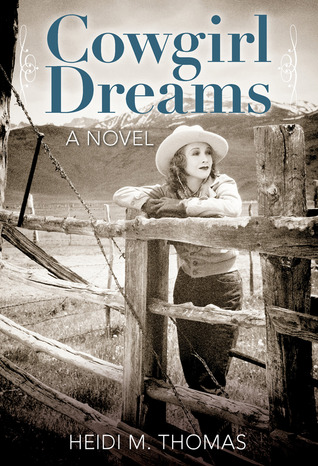 Cowgirl Dreams by Heidi M. Thomas. Came to my attention via Amazon's recommendations. I'm interested because it's a woman doing the rodeo circuit in times when that was not "acceptable" and also it takes place in Montana.
Cowgirl Dreams by Heidi M. Thomas. Came to my attention via Amazon's recommendations. I'm interested because it's a woman doing the rodeo circuit in times when that was not "acceptable" and also it takes place in Montana.
From her ranch home in Montana in the 1920s, Nettie Brady dreamed of joining the rodeo circuit and becoming a star. Defying her mother's wishes and trading her skirts for trousers--and riding the range with her brothers and taking on the occasional half-ton steer in local rodeos--Nettie bucked convention to compete with men in the arena. When family hardship and tragedy threaten her plans, she turns back toward a more traditional life as a ranch woman, but chafes against its restrictions. Then she meets and falls in love with a young neighbor who rides broncs and raises rodeo stock. Can Nettie's rodeo dreams come true if she's also a wife and mother?
Based on the life of the author's grandmother, a real Montana cowgirl, this novel takes on the big issues of a woman's place in the west, the crushing difficulties of surviving on a homestead, and the excitement and romance of a young girl aching to follow her dream.
***
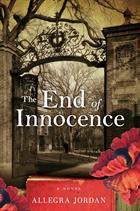 Spotted on Edelweiss and on my wishlist. Sourcebooks Landmark tends to have some great titles and rarely disappoint me: The End of Innocence by Allegra Jordan. The whole woman at Harvard thing grabbed me.
Spotted on Edelweiss and on my wishlist. Sourcebooks Landmark tends to have some great titles and rarely disappoint me: The End of Innocence by Allegra Jordan. The whole woman at Harvard thing grabbed me.
On the eve of WWI, two students fall in love in Harvard's hallowed halls and must face a world at war from opposing sides
Helen Windship Brooks is struggling to find herself at the world-renowned Harvard-Radcliffe University when brooding German poet Wils bursts into her life. As they fall deeply in love on the brink of WWI, anti-German sentiments mount and Wils' future at Harvard-and in America-is in increasing danger. When Wils is called to fight for the Kaiser, Helen must decide if she is ready to fight her own battle for what she loves most.
From Harvard's hallowed halls to Belgium's war-ravaged battlefields, The End of Innocence is a powerful new vision of finding love and hope in a violent, broken world.
Spotted on a friend's blog: Cicada by Moira McKinnon. It's on my wishlist as sadly it doesn't appear to even be available to the States. :(
 A stunning novel of terror, love and survival in the greatest wilderness on earth. A lyrical, heartbreaking epic debut.
A stunning novel of terror, love and survival in the greatest wilderness on earth. A lyrical, heartbreaking epic debut.An isolated property in the middle of Western Australia, just after the Great War. An English heiress has just given birth and unleashed hell. Weakened and grieving, she realises her life is in danger, and flees into the desert with her Aboriginal maid. One of them is running from a murderer; the other is accused of murder.
Soon the women are being hunted across the Kimberley by troopers, trackers and the man who wants to silence them both. How they survive in the searing desert and what happens when they are finally found will take your breath away.
***
 Cowgirl Dreams by Heidi M. Thomas. Came to my attention via Amazon's recommendations. I'm interested because it's a woman doing the rodeo circuit in times when that was not "acceptable" and also it takes place in Montana.
Cowgirl Dreams by Heidi M. Thomas. Came to my attention via Amazon's recommendations. I'm interested because it's a woman doing the rodeo circuit in times when that was not "acceptable" and also it takes place in Montana.From her ranch home in Montana in the 1920s, Nettie Brady dreamed of joining the rodeo circuit and becoming a star. Defying her mother's wishes and trading her skirts for trousers--and riding the range with her brothers and taking on the occasional half-ton steer in local rodeos--Nettie bucked convention to compete with men in the arena. When family hardship and tragedy threaten her plans, she turns back toward a more traditional life as a ranch woman, but chafes against its restrictions. Then she meets and falls in love with a young neighbor who rides broncs and raises rodeo stock. Can Nettie's rodeo dreams come true if she's also a wife and mother?
Based on the life of the author's grandmother, a real Montana cowgirl, this novel takes on the big issues of a woman's place in the west, the crushing difficulties of surviving on a homestead, and the excitement and romance of a young girl aching to follow her dream.
***
 Spotted on Edelweiss and on my wishlist. Sourcebooks Landmark tends to have some great titles and rarely disappoint me: The End of Innocence by Allegra Jordan. The whole woman at Harvard thing grabbed me.
Spotted on Edelweiss and on my wishlist. Sourcebooks Landmark tends to have some great titles and rarely disappoint me: The End of Innocence by Allegra Jordan. The whole woman at Harvard thing grabbed me.On the eve of WWI, two students fall in love in Harvard's hallowed halls and must face a world at war from opposing sides
Helen Windship Brooks is struggling to find herself at the world-renowned Harvard-Radcliffe University when brooding German poet Wils bursts into her life. As they fall deeply in love on the brink of WWI, anti-German sentiments mount and Wils' future at Harvard-and in America-is in increasing danger. When Wils is called to fight for the Kaiser, Helen must decide if she is ready to fight her own battle for what she loves most.
From Harvard's hallowed halls to Belgium's war-ravaged battlefields, The End of Innocence is a powerful new vision of finding love and hope in a violent, broken world.
Published on April 05, 2014 00:00
April 4, 2014
Doctors Beyond Borders by Georgie Tyler
 First of all, I'm amazed that this appears to be a debut novel. Surely this is an-already established author using a new pen name? I say this because the book contains none of the stilted, awkward, juvenile or fifth-grade writing I've come to expect in a first-time book, especially with a digital publisher. It's very well written.
First of all, I'm amazed that this appears to be a debut novel. Surely this is an-already established author using a new pen name? I say this because the book contains none of the stilted, awkward, juvenile or fifth-grade writing I've come to expect in a first-time book, especially with a digital publisher. It's very well written.If I were to complain about anything in this story, it would be too much sexual tension. It made for excellent relationship development and it's true that most books don't have any of this anymore and that's become a common complaint from me. Most of the time people just jump into bed together after catching each other's eyes, on page two. But though I was fully aware this was a romance, I was more interested in the background story involving doctors amid the political and social turmoil of Sudan, and I felt the constant sexual tension distracted from a greater issue. I just began to skim the story every time their body parts began doing things within their clothes and I also grew weary of being reminded of how hot the hero and heroine are, her slender legs, his muscular abs...etc, etc (I was like, "Okay already!" The constant hardening of his groin and dripping into her panties made them seem shallow at times--ESPECIALLY Ford (is that all there is to him, horniness?), though one could also argue that their lust is the only bright spot in rather dark conditions.
But moving on: I knew nothing about Sudan before picking this up. I didn't even know where it was, let along that there was a civil war. Through the heroine's eyes, we experience the sand, the mud from the sudden rains, learn of the disease and starvation and what's done to help the people, and feel fear when the warlords show up to do harm or steal supplies...or leave behind executed bodies.
The heroine doesn't come off as very strong at first. She's basically just running away from a failed relationship, which is kinda wimpy, but by the end of the novel, she's all about helping others, even if it means placing herself in peril. I guess what she does is dumb, but I saw it as brave too. I just wish she didn't end up needing a man to save her.
Conclusion: superb writing, lots (just too much for me) of romance, some educational bits, and overall, worth one's time. It fell kind of lukewarm for me because by the time the hero and heroine took care of their lusty feelings, I just wanted it to get to the point.
I got this on netgalley.

Published on April 04, 2014 00:00
April 3, 2014
Strong is Sexy Heroine of the Week: Allie Taylor
 Book: Rook: Allie's War, Book One
Book: Rook: Allie's War, Book OneAuthor: J.C. Andrijeski
Heroine: Allie Taylor
Allie Taylor is strong in a way I don't see a lot of female heroines in media these days. Meaning, she doesn't carry a sword, or defeat fifteen opponents with preternatural kung-fu moves, or curse people out, or make a lot of sarcastic comments or belittle the men she's secretly attracted to, or kick and scream when she should probably be listening to the people who actually know what's going on in whatever dangerous situation she happens to find herself in...instead, Allie's smart, which means she knows when to argue and also when she should probably be silent and figure out what's going on, first, or even just run like hell if she's outmatched.
She also knows when she doesn't know something...which happens to her a lot in the first book of the Allie's War series, Rook: Allie's War, Book One, where she first meets Dehgoies Revik, and finds out she may not be human after all.
Allie lives in a version of modern-day Earth where a second race of seers was discovered during the early 1900s in Asia, and since then have been mostly enslaved by human beings. That second race, called Sarhaciennes, "Sarks," or seers, can read minds, push people to think or do things they wouldn't otherwise do, and spy on people from great distances. They operate in a nonphysical plane they call "The Barrier," and are kept under control by humans with sight-restraint collars, a very small population relative to humans, and a lot of laws limiting their movement and associations.
Allie gets thrust into this world, and the shadow world of seers that exists just behind the human world, with little or nothing to help her find her way. Yet she manages to not only adjust, but to take charge of her new role in this world, and to match her so-called teacher and guardian, Revik, almost from day one. He finds her sexy for that very reason, as well as the fact that she sees through who he pretends to be from the beginning...which simultaneously turns him on, intrigues him and scares the crap out of him as soon as they enter one another's lives.
Blurb:
 Like most humans, Allie’s spent her life distancing herself from Seers, a race of human-like beings discovered on Earth in the early 1900s. After catching her boyfriend in the arms of a hot band groupie, however, that changes, and Allie goes from San Francisco artist slacker to the girl wearing the GPS anklet overnight. But that’s nothing compared to the shock of discovering who—and what—she really is.
Like most humans, Allie’s spent her life distancing herself from Seers, a race of human-like beings discovered on Earth in the early 1900s. After catching her boyfriend in the arms of a hot band groupie, however, that changes, and Allie goes from San Francisco artist slacker to the girl wearing the GPS anklet overnight. But that’s nothing compared to the shock of discovering who—and what—she really is.Yanked out of her life by the mysterious Revik, Allie finds out that her blood may not be as indisputably human as she always thought. Through Revik she learns the truth: that Seers are nothing like she thought, that the world is nothing like it appears to be... and that she has far more in common with Seers than she ever wanted to believe.
Now on the run from a group of anti-human, terrorist Seers called Rooks, and her own human government, Allie must learn to navigate a secret shadow world behind her own, a world filled with superhuman Seers with their own battles, and their own agendas around the fate of humanity. When Allie’s family and friends get dragged into that war, things suddenly get a lot more personal, and Allie finds she may be the only one who can stop it.
Excerpt:
Revik sprinted down the sidewalk, holding me against his chest. Unerringly rhythmic, his feet impacted the sidewalk as if he counted steps alongside well-regulated breaths. He held me close, and that felt calculated too, as if he’d practiced with potato sacks approximating my weight. When he reached the gravel-strewn hillside, he barely paused before vaulting up the steep bank, sliding in its shale folds at each step.
I felt sick, dazed, unsure on which side I lived. It becomes clearer as images around me flash in negative...then the Pyramid is everywhere; its silver threads shine like bright wires in rose-lit clouds. Tarnished silver entangles people on the sleepy Washington street. Red eyes surround me, bodies made of wire...
Laughter brings my eyes higher.
A face hovers below the Pyramid, and I recognize it as a ghostly version of the man from Golden Gate Park. His face morphs in Barrier wind; there is symmetry to the flickers of light, like film stuttering in a projector.
The Pyramid’s shifting cells split and reconfigure, moving on gliding rails like a carnival fun house.
I see you! Pretty bird! Do you know who carries you on such swift wings?
I feel my chest clench.
My mother calls me her bird.
I feel Revik again, his arms around me, the steady beating in his chest. No one has ever felt so much like me.
Terian’s laugh rises. I could tell you such stories about your new friend! Do you know what he used to like to do for fun?
Images start to coalesce, movies that start once I focus directly on them. They draw me in, until I want to see. I feel Revik there...a part of my fascination comes from him. He and Terian stand before a young girl with blond hair and a beautiful face and Revik’s eyes are hard, calculating. The predator is there, but he lives in silver light—
A jarring contact met my head and back. I gasped.
Pain brought the physical world into focus. Staring down at me is Revik’s sweaty face. His eyes are still glass shards, but the silver light is gone. Fear lives in them, faint but visible. He’d laid me roughly on the hood of the GTX. My back hit the protruding air vent on top, hard enough that I wondered if he’d done it on purpose.
Either way, the impact snapped me away from Terian’s mind.
I struggled to sit up as he walked to the rear of the car, opening the trunk with the keys and pulling out a black gym bag filled with something heavy. He reached inside the driver’s side window to unlock the door.
“Allie!” he said, jerking it open. “Now!”
I rolled over the hood to the passenger side while he leaned over and opened my door from the inside. By the time I got in, he was already ripping open the black nylon bag, and it struck me that the line of cars behind us had resumed honking. I watched Revik jam the key into the ignition, holding a gun against the steering wheel.
“Put on your seat belt!” he said.
I fumbled with the strap as the GTX’s engine rumbled to life. He put the car in gear. Then a voice emerged above the sound of the car’s motor. It took me a second to realize it was real...that it wasn’t his.
“What in the name of Mary’s tits...”
I crouched down, looking past Revik through the driver’s side window. Two cops stood there. Behind them, a black and white slanted down the bank beside the fisherman’s truck. The one who’d spoken stared at the gun in Revik’s hand.
“You got balls, buddy,” the second cop said, unholstering his sidearm. He raised the gun, aiming at Revik’s face. “Now toss it out the window. Real slow...”
“Sleep,” Revik said. “Now.”
Both cops collapsed on the onramp without emitting a sound.
I sucked in a breath, shocked at the clean indifference of the act. The one holding the gun wasn’t much older than me. In the rearview mirror, I saw movement in the space by the fisherman’s truck. I turned my head as another policeman emerged.
My voice burst out of me.
“Revik!” I yelled.
The third cop pulled his sidearm. I saw the brown eyes flash silver as he raised the gun.
“Seer!” I yelled.
“I know,” Revik growled.
His hand clamped the back of my neck, forcing me down past the bottom of the seat. He took his foot off the brake and the car lurched forward as the cop squeezed off his first round.
The sound of the shot seemed to come late, after the soft plink as the bullet went through the rear driver’s side window. I turned my head, staring at the hole in the upholstery until Revik shoved me down further on the seat.
I crouched on the mat when I heard the GTX’s engine roar back to life. I slid out from under the seat belt as he threw the car into reverse, slamming into the truck behind us. By then he had aimed the handgun and fired at Cop #3. He hit him in the chest on the second shot, knocking him backwards into the police car so that the man’s arm and shoulder broke the passenger side window.
The cop’s partner emerged, firing wildly.
Screams erupted on the street. I watched people run and duck in fear, eyes wide, and for a moment, I see them through Revik’s eyes, a flock of birds scattering...then Revik swiveled the gun towards the fourth cop, narrowly missing the man’s head.
He stepped on the gas...
But his foot slipped. The engine’s rev faded. I looked up, saw Revik slumped in the seat as the car continued to roll. I froze, seeing his eyes glaze as the car veered towards the edge of the road. I threw myself up and into his lap, hauling the wheel to the left with my cuffed hands, trying to get my foot down to his, to keep the car from stalling...
...when just as suddenly, he was back. I felt it just before he raised his head, jerking into life. The gun rested on his lap, pointed at his feet from where he’d slumped in the cloth seat. He stared at my handcuffs as if he didn’t know what they were. His eyes narrowed on mine.
“Revik!” I screamed. “Snap out of it!”
His eyes clicked abruptly into focus.
Amazon - Smashwords - iBooks - Omnilit - Drive-Thru Fiction - Barnes and Noble
Published on April 03, 2014 00:00
April 2, 2014
Seance in Sepia by Michelle Black
Today Shomeret and I are both sharing our thoughts with you on this title.
The premise:
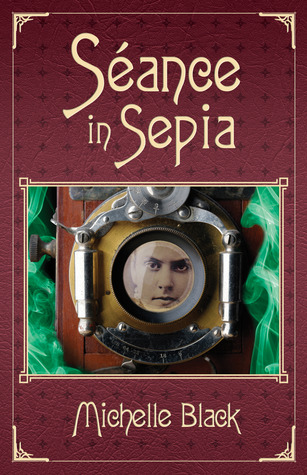 When the price of an unusual picture called a spirit photograph, which some Victorian spiritualists claimed was a photograph of the departed taken during a seance, sells at auction for over a thousand dollars, Flynn Keirnan is determined to discover the story behind it. She soon learns the ghostly images of the woman and two men in the picture were the subjects of a sensational murder trial in 1875 Chicago. A young architect was accused of killing his wife and best friend in what the local press dubbed The Free Love Murders. Flynn tracks the story through many sources, including the trial transcript, a journal kept by one of the victims, and notes from a jailhouse interview with the husband conducted by feminist firebrand Victoria Woodhull for her radical newspaper. Woodhull, also known as a spiritualist, was asked by the accused to contact the spirits of his wife and friend to obtain details about the deaths. Was it a double homicide, a double suicide, or a murder-suicide and, if so, who killed whom? Flynn Keirnan discovers the key to solving the Free Love murders lies in learning the provenance of the photograph itself. When she does she finds that, like Victoria, her own outlook on love has changed.
When the price of an unusual picture called a spirit photograph, which some Victorian spiritualists claimed was a photograph of the departed taken during a seance, sells at auction for over a thousand dollars, Flynn Keirnan is determined to discover the story behind it. She soon learns the ghostly images of the woman and two men in the picture were the subjects of a sensational murder trial in 1875 Chicago. A young architect was accused of killing his wife and best friend in what the local press dubbed The Free Love Murders. Flynn tracks the story through many sources, including the trial transcript, a journal kept by one of the victims, and notes from a jailhouse interview with the husband conducted by feminist firebrand Victoria Woodhull for her radical newspaper. Woodhull, also known as a spiritualist, was asked by the accused to contact the spirits of his wife and friend to obtain details about the deaths. Was it a double homicide, a double suicide, or a murder-suicide and, if so, who killed whom? Flynn Keirnan discovers the key to solving the Free Love murders lies in learning the provenance of the photograph itself. When she does she finds that, like Victoria, her own outlook on love has changed.
Our Thoughts:
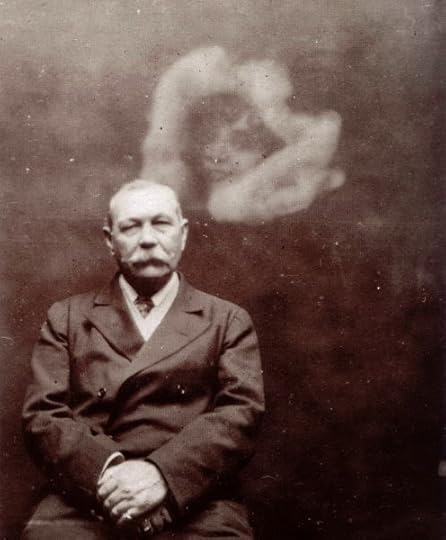 Sir Arthur Conan Doyle in a spirit photograph
Sir Arthur Conan Doyle in a spirit photograph
Shomeret: This is supposed to be a historical mystery with a contemporary story line, but I didn't consider either the history or the mystery adequately handled.
Tara: I actually really liked the mystery. Well, except I confess I grew confused by the time changes. We suddenly went from court transcriptions to jumping back a few months or a year or so before the murder even transpired to jumping forward to Victoria Woodhull after the court events occurred and I was quite jarred at times. I think I just truly love court-room drama and that is what saved this for me. But it did grow confusing.
The contemporary story-line...didn't do much for me. I quickly forgot about the characters as soon as the historical scenes popped up again. When it switched to contemporary, I was like, "Oh, I forgot about these people!" I thought dialogue in the contemporary scenes was well done though--the banter btw characters.
Shomeret: I liked the themes dealt with in this book, but there isn't enough development of the context. I did notice a rather detailed description of 19th century photography techniques which could be fascinating if that interests you. Yet I thought the Oneida Community, which was fairly essential background was given short shrift. Someone who knows nothing about it, wouldn't really understand that it's significant. I would have wanted a flashback.
Tara: I, too, wanted more of that community. It seemed interesting and yet so passing in mention. I wonder if anyone has penned a novel about it?
Also of note are the mentions of Anthony Comstock and Reverend Henry Ward Beecher. I feel like too often in the story, we were teased, having tidbits of fascinating information dangled in front of us but not really followed through on, forcing us instead to browse the Internet for more data. Did you find yourself wanting to know about those men?
Speaking of themes, did you feel there was a strong moral about leading two men along? About self-absorption? Also, of turning a religion or belief to suit your whims--such as Medora using VW's speeches as an excuse to have her rich husband and her poor lover?
I wanted to slap Medora. (Another complaint comes to mind--this woman was called by three different names in the story, confusing me more than once. It was Mrs. This, Miss That, and sometimes her first name. URGH.)
Shomeret: I already know quite a bit about Anthony Comstock and Henry Ward Beecher. This is an area of history that I've studied. Comstock was known for his censorship particularly of birth control information. Henry Ward Beecher was a highly respected preacher, but he is also associated with a scandal regarding his involvement with another man's wife. See the Beecher-Tilton Scandal.
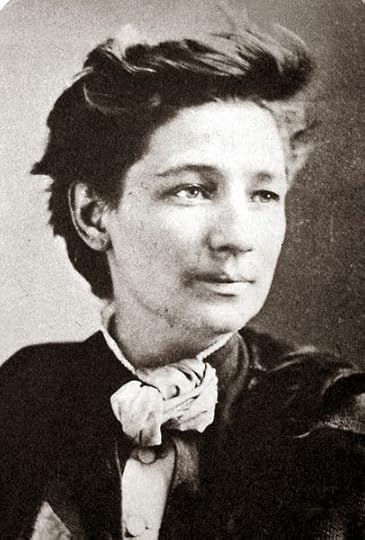 Victoria WoodhullTara: *embarrassed* I feel ignorant as this is the first I've heard of them and the scandal. Beecher--I've heard his name, never paid much attention.
Victoria WoodhullTara: *embarrassed* I feel ignorant as this is the first I've heard of them and the scandal. Beecher--I've heard his name, never paid much attention.
Shomeret: I also don't think that we should just be told that Victoria Woodhull was a prominent medium. Show her performing a seance. Don't just imply that she was genuine, give us a convincing scene. I love authenticity in my paranormal content.
Tara: Excellent point. I was rather surprised and disappointed that VW does nothing really but talk to the people involved. She doesn't even really investigate. There's no contacting of spirits, no paranormal premonitions, NOTHING. She just listens to people talk. If VW had not actually been involved in this real-life case, there would be no point in using her. She could, I feel, be just any random woman in this book. There isn't enough spiritualism to even say "random spiritualist".
Shomeret: As a huge fan of Victoria Woodhull, I would have loved a series in which she solved mysteries. Yet this book didn' t really do that. There were scenes from the murder trial, but it's like getting only the last half of a Law and Order episode. Where was the investigation?
Tara: I love Law & Order, probably why I enjoyed the transcriptions so much. You are right again about the lack of investigation. Perhaps the book would have been improved with an actual detective having some scenes/a major part of the story? But then I also think their investigation skills were quite poor in the late 1800s. I doubt it would be as interesting as a book with more modern investigative techniques.
Shomeret: Victoria Woodhull was a controversial figure in her time because of her advocacy and practice of what was then called "free love" and "complex marriage". Today practitioners call it "polyamory" and it is still largely considered unacceptable. For further background about Victoria Woodhull and free love, see The Beecher-Tilton Scandal. Yet remember that she was the first woman to sit on the New York Stock Exchange and the first woman to run for President of the United States. She had some tremendous achievements for which she should be respected. Her scandalous personal life isn't the only factor for which she should be judged.
Tara: And you bring me right to why despite my enjoyment for the most part of the story, I'm taking away a solid bike. This takes me back to what I said above, about being teased. This is from the book:
"You and your sister were the lady stockbrokers, weren't you? I remember it now. Quite a splash you made on Wall Street. Vanderbilt was once your client, wasn't here?"
When she wasn't opening the first female-owned brokerage house on Wall Street, or addressing the U.S. Congress on the subject of woman's suffrage, or running her own radical newspaper, she was known to run for presidency of the United States.
There is so much to VW--all the things you mentioned and more. Though I realize these previous accomplishments don't really tie into the murder mystery, I found myself wondering, "Why even put VW in this story if you aren't going to address any of the most interesting and amazing things about her?" As I said above, I felt her character could have been just anyone of that time period. The story didn't really make feel that I was getting to know the Victoria I wanted know--the lady who ran for president and worked on Wall Street...not even her as a spiritualist.
I also feel the book is too short for what it encompasses--two story lines, four different types of scenes...and this prevented us from really getting involved with, getting to know any of the characters deeply enough for them to impact. It just touched on each person so briefly. We would just be getting to know Flynn a tiny bit and suddenly we're back to Cam.
Shomeret: I agree. If the book were longer the contemporary characters and plot line could have been better developed.
Tara: My conclusion: I liked it for the most part, wasn't bored and didn't find myself skimming. I was actually torn between a three and a four until I reached the end and then I said, "What the hell is with the David Halloway and Brody thing? Who cares about a past dalliance of this woman we barely know? It added NOTHING to the story. That made it a three for me. Shomeret?
Tara's Rating:
Shomeret's Rating:
Oh--we bought our copies. :D
 From stock.xchngShomeret is an aspiring writer who loves all things historical and quality fiction that is original in some way. She inhabits the borderland called liminality by anthropologists. She rides a leopard in her imagination.
From stock.xchngShomeret is an aspiring writer who loves all things historical and quality fiction that is original in some way. She inhabits the borderland called liminality by anthropologists. She rides a leopard in her imagination.
If you love her review, you can find more of them on her blog or follow her on Goodreads.
The premise:
 When the price of an unusual picture called a spirit photograph, which some Victorian spiritualists claimed was a photograph of the departed taken during a seance, sells at auction for over a thousand dollars, Flynn Keirnan is determined to discover the story behind it. She soon learns the ghostly images of the woman and two men in the picture were the subjects of a sensational murder trial in 1875 Chicago. A young architect was accused of killing his wife and best friend in what the local press dubbed The Free Love Murders. Flynn tracks the story through many sources, including the trial transcript, a journal kept by one of the victims, and notes from a jailhouse interview with the husband conducted by feminist firebrand Victoria Woodhull for her radical newspaper. Woodhull, also known as a spiritualist, was asked by the accused to contact the spirits of his wife and friend to obtain details about the deaths. Was it a double homicide, a double suicide, or a murder-suicide and, if so, who killed whom? Flynn Keirnan discovers the key to solving the Free Love murders lies in learning the provenance of the photograph itself. When she does she finds that, like Victoria, her own outlook on love has changed.
When the price of an unusual picture called a spirit photograph, which some Victorian spiritualists claimed was a photograph of the departed taken during a seance, sells at auction for over a thousand dollars, Flynn Keirnan is determined to discover the story behind it. She soon learns the ghostly images of the woman and two men in the picture were the subjects of a sensational murder trial in 1875 Chicago. A young architect was accused of killing his wife and best friend in what the local press dubbed The Free Love Murders. Flynn tracks the story through many sources, including the trial transcript, a journal kept by one of the victims, and notes from a jailhouse interview with the husband conducted by feminist firebrand Victoria Woodhull for her radical newspaper. Woodhull, also known as a spiritualist, was asked by the accused to contact the spirits of his wife and friend to obtain details about the deaths. Was it a double homicide, a double suicide, or a murder-suicide and, if so, who killed whom? Flynn Keirnan discovers the key to solving the Free Love murders lies in learning the provenance of the photograph itself. When she does she finds that, like Victoria, her own outlook on love has changed.Our Thoughts:
 Sir Arthur Conan Doyle in a spirit photograph
Sir Arthur Conan Doyle in a spirit photograph
Shomeret: This is supposed to be a historical mystery with a contemporary story line, but I didn't consider either the history or the mystery adequately handled.
Tara: I actually really liked the mystery. Well, except I confess I grew confused by the time changes. We suddenly went from court transcriptions to jumping back a few months or a year or so before the murder even transpired to jumping forward to Victoria Woodhull after the court events occurred and I was quite jarred at times. I think I just truly love court-room drama and that is what saved this for me. But it did grow confusing.
The contemporary story-line...didn't do much for me. I quickly forgot about the characters as soon as the historical scenes popped up again. When it switched to contemporary, I was like, "Oh, I forgot about these people!" I thought dialogue in the contemporary scenes was well done though--the banter btw characters.
Shomeret: I liked the themes dealt with in this book, but there isn't enough development of the context. I did notice a rather detailed description of 19th century photography techniques which could be fascinating if that interests you. Yet I thought the Oneida Community, which was fairly essential background was given short shrift. Someone who knows nothing about it, wouldn't really understand that it's significant. I would have wanted a flashback.
Tara: I, too, wanted more of that community. It seemed interesting and yet so passing in mention. I wonder if anyone has penned a novel about it?
Also of note are the mentions of Anthony Comstock and Reverend Henry Ward Beecher. I feel like too often in the story, we were teased, having tidbits of fascinating information dangled in front of us but not really followed through on, forcing us instead to browse the Internet for more data. Did you find yourself wanting to know about those men?
Speaking of themes, did you feel there was a strong moral about leading two men along? About self-absorption? Also, of turning a religion or belief to suit your whims--such as Medora using VW's speeches as an excuse to have her rich husband and her poor lover?
I wanted to slap Medora. (Another complaint comes to mind--this woman was called by three different names in the story, confusing me more than once. It was Mrs. This, Miss That, and sometimes her first name. URGH.)
Shomeret: I already know quite a bit about Anthony Comstock and Henry Ward Beecher. This is an area of history that I've studied. Comstock was known for his censorship particularly of birth control information. Henry Ward Beecher was a highly respected preacher, but he is also associated with a scandal regarding his involvement with another man's wife. See the Beecher-Tilton Scandal.
 Victoria WoodhullTara: *embarrassed* I feel ignorant as this is the first I've heard of them and the scandal. Beecher--I've heard his name, never paid much attention.
Victoria WoodhullTara: *embarrassed* I feel ignorant as this is the first I've heard of them and the scandal. Beecher--I've heard his name, never paid much attention.Shomeret: I also don't think that we should just be told that Victoria Woodhull was a prominent medium. Show her performing a seance. Don't just imply that she was genuine, give us a convincing scene. I love authenticity in my paranormal content.
Tara: Excellent point. I was rather surprised and disappointed that VW does nothing really but talk to the people involved. She doesn't even really investigate. There's no contacting of spirits, no paranormal premonitions, NOTHING. She just listens to people talk. If VW had not actually been involved in this real-life case, there would be no point in using her. She could, I feel, be just any random woman in this book. There isn't enough spiritualism to even say "random spiritualist".
Shomeret: As a huge fan of Victoria Woodhull, I would have loved a series in which she solved mysteries. Yet this book didn' t really do that. There were scenes from the murder trial, but it's like getting only the last half of a Law and Order episode. Where was the investigation?
Tara: I love Law & Order, probably why I enjoyed the transcriptions so much. You are right again about the lack of investigation. Perhaps the book would have been improved with an actual detective having some scenes/a major part of the story? But then I also think their investigation skills were quite poor in the late 1800s. I doubt it would be as interesting as a book with more modern investigative techniques.
Shomeret: Victoria Woodhull was a controversial figure in her time because of her advocacy and practice of what was then called "free love" and "complex marriage". Today practitioners call it "polyamory" and it is still largely considered unacceptable. For further background about Victoria Woodhull and free love, see The Beecher-Tilton Scandal. Yet remember that she was the first woman to sit on the New York Stock Exchange and the first woman to run for President of the United States. She had some tremendous achievements for which she should be respected. Her scandalous personal life isn't the only factor for which she should be judged.
Tara: And you bring me right to why despite my enjoyment for the most part of the story, I'm taking away a solid bike. This takes me back to what I said above, about being teased. This is from the book:
"You and your sister were the lady stockbrokers, weren't you? I remember it now. Quite a splash you made on Wall Street. Vanderbilt was once your client, wasn't here?"
When she wasn't opening the first female-owned brokerage house on Wall Street, or addressing the U.S. Congress on the subject of woman's suffrage, or running her own radical newspaper, she was known to run for presidency of the United States.
There is so much to VW--all the things you mentioned and more. Though I realize these previous accomplishments don't really tie into the murder mystery, I found myself wondering, "Why even put VW in this story if you aren't going to address any of the most interesting and amazing things about her?" As I said above, I felt her character could have been just anyone of that time period. The story didn't really make feel that I was getting to know the Victoria I wanted know--the lady who ran for president and worked on Wall Street...not even her as a spiritualist.
I also feel the book is too short for what it encompasses--two story lines, four different types of scenes...and this prevented us from really getting involved with, getting to know any of the characters deeply enough for them to impact. It just touched on each person so briefly. We would just be getting to know Flynn a tiny bit and suddenly we're back to Cam.
Shomeret: I agree. If the book were longer the contemporary characters and plot line could have been better developed.
Tara: My conclusion: I liked it for the most part, wasn't bored and didn't find myself skimming. I was actually torn between a three and a four until I reached the end and then I said, "What the hell is with the David Halloway and Brody thing? Who cares about a past dalliance of this woman we barely know? It added NOTHING to the story. That made it a three for me. Shomeret?
Tara's Rating:

Shomeret's Rating:

Oh--we bought our copies. :D
 From stock.xchngShomeret is an aspiring writer who loves all things historical and quality fiction that is original in some way. She inhabits the borderland called liminality by anthropologists. She rides a leopard in her imagination.
From stock.xchngShomeret is an aspiring writer who loves all things historical and quality fiction that is original in some way. She inhabits the borderland called liminality by anthropologists. She rides a leopard in her imagination. If you love her review, you can find more of them on her blog or follow her on Goodreads.
Published on April 02, 2014 00:00
April 1, 2014
The Book Thief (the Movie, Not the Book)
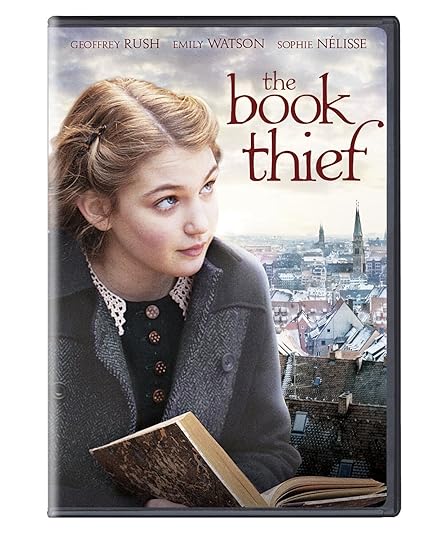 I can't believe I'm about to say this, but I did not read the book. I know; shame on me, right?
I can't believe I'm about to say this, but I did not read the book. I know; shame on me, right?I am somewhat glad of this though. Why? Because the people who read the book will be comparing the book to the movie the entire time. I was able to view, and thus enjoy, the movie as though it was an entirely new experience, which it was.
I don't know if there's a huge point to this movie. It's just a story about life in Germany during the war, from the POV of a young girl. I guess that is the point. When we think of WWII or read about it or watch movies about it, it's very rare that we see what the war was like for those in Germany. We often forget about them. They were the enemy, after all, but it's important to remember and I feel this movie reminds of us of it, that there are innocents on both sides.
The people in Germany, many of them tried to help others, be it hiding Jews from persecution or speaking up in defense of their fellow men being wronged. The risks for even this were great. As we see in the movie...if you speak "out of turn", you'll be conscripted! Or shoved around...or watched...
The girl is a spunky. I liked her. She falls in love with words and after the book-burning, she "borrows" books from a wealthy lady. She's compassionate and though it takes her a while to warm to some people, when she loves, she loves with all her heart. To me this was another lesson in the story: Don't close yourself off from others. Let yourself loved and be loved in return no matter what bad things happen to you.
The acting, costumes, setting--superb. The narrative is death. That was creepy, surprising, and totally worked.
There's death. This is a sad one. Nobody comes out of war unscathed. You'll cry. I did.
My only quibble: I'd have liked to know what happened to Max while he was out of the picture.
I rented this on Amazon Prime.

Published on April 01, 2014 00:00
March 31, 2014
Running by Patrice Fitzgerald
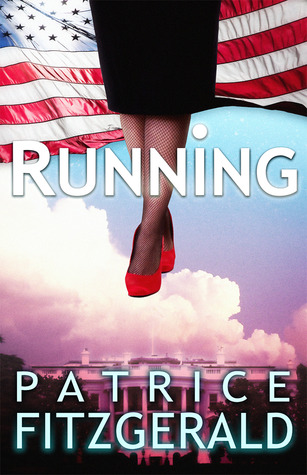 I was drawn to this story because it's about a woman running for president of the United States. In this story, she's already a Vice President, so she's pretty darn close, and as a woman in the White House is something I'm dying to see in my lifetime, I was eager to read this.
I was drawn to this story because it's about a woman running for president of the United States. In this story, she's already a Vice President, so she's pretty darn close, and as a woman in the White House is something I'm dying to see in my lifetime, I was eager to read this.I will say that even though I liked it for the most part, it wasn't what I was hoping for. It's more of a suspense type thing, not a political story. It's a story of secrets, blackmail, betrayal, and high-speed chases, with lots of people trying to turn things to benefit them. Anyway, when the president gets ill and the heroine is asked to take over the office while he recuperates, we don't see her implementing any important changes or doing anything remotely interesting. All she does is go to fundraisers. I was hoping for more serious stuff.
The most it delves into real politics is by showing us what the TV networks do. It really brought to light how much control the television and newscasters have over public opinion. It made it all seem so ridiculous, and it is. I also appreciate how this story really hit home the fact that some behavior is totally acceptable for men, but not for women. We're still living by the double standard.
"The public allows men to have a sexual appetite. It's still shocking in a woman."
The story also reminds us what should really take priority when selecting someone into office. Can they lead us? Can they make the right decisions? That's what it should be about, not who they slept with 20, 30 years ago or how many children they may have.
"A little sex scandal is nothing compared to sending soldiers to die."
I did like it, but I have some quibbles. I knew who the blackmailer was asap. I also figured out who the daughter was too soon too. I'd have liked to be have been left in suspense a bit longer. The blackmailer's scenes became annoying too. I would have toned this person's parts back a bit, though I do appreciate the other moral/theme here, about how drug addiction can take a decent, well-educated, successful person, and just make them a monster. I also had some trouble with the "scandal", well, with how the heroine handled it when she was young. I thought her reasons for doing what she did lame and it kind of made me lose respect for her. I mean, my personal opinion: the country handles interracial children a lot better than they would ever handle a woman president.
"Sometimes the best man for the job is a woman."
I nabbed this on Amazon a while back.

Published on March 31, 2014 00:00
March 30, 2014
Because Two Feminists Are Better Than One: Please Welcome Shomeret
 Naw, naw, naw *pffft*
Naw, naw, naw *pffft*Image from stock.xchngBook Babe has changed a lot since it first started. It was at one time only book reviews. Then it grew to include author interviews, Strong is Sexy posts, and soon, guest posts. For a brief period, I harassed you all about my own darn books. Now, you're even seeing movie reviews on here, movies I feel you'd all be interested in too, featuring strong or amazing women.
It's my blog and I can do what I want to. *see dog blowing raspberry to the left*
It's been fun, hasn't it?
Today I want to share something else exciting and new to Book Babe. I'd like you all to welcome a new reviewer. She's not NEW to the review industry. She's had a Goodreads account for a long time and has been my friend on there for years. I've asked her to join me on here because I love her reviews. She has such great insight and every one of her reviews is interesting. She always backs up her POV with research and I always look forward to her thoughts and opinions on a book.
 from stock.xchngPlease welcome Shomeret, an aspiring writer who loves all things historical and quality fiction that is original in some way. She inhabits the borderland called liminality by anthropologists. She rides a leopard in her imagination.
from stock.xchngPlease welcome Shomeret, an aspiring writer who loves all things historical and quality fiction that is original in some way. She inhabits the borderland called liminality by anthropologists. She rides a leopard in her imagination.Shomeret will be posting reviews on Book Babe when she feels like. She also loves strong heroines and to quote her when I invited her to join me, believes, "two feminists are better than one." So you can see why I like her. :)
You may see something from her once a week, twice a week, once a month; it's up to her. We sometimes read the same books and have differing opinions, so sometimes you'll see double reviews. We are occasionally going to read the same novel and post both our reviews here on the same post and let you all decide for yourself if the book is for you.
I hope you all show her the same enthusiasm you do me... Actually, no, please show her more. LOL. (Sometimes I wonder where you're all at. *smh*)
For those wondering, she does have a blog, but it's down at this time. When it is back up, she will be informing you all. You can follow her on Goodreads though.
I'll be making tiny changes around here; My Reading Radar will become OUR Reading Radar and so on, but everything else will stay the same. I should change the banner to Book Babes. Heck, I should have changed my banner to Books & Movies Hits & Misses & More, but that takes money and I love my banner as is. LOL
But you will know. It's Book BABES now.
Thanks, everyone, and have a great Sunday, and OH---period drama fans, don't forget tonight is two season premieres one after the other: season three of Call the Midwife and season two of Mr. Selfridge, both on PBS.
Published on March 30, 2014 00:00
March 29, 2014
My Reading Radar (3/29/2014)
 Spotted on my friend's blog and now on my wishlist. Charming the Duke by Holly Bush.
Spotted on my friend's blog and now on my wishlist. Charming the Duke by Holly Bush.1849 . . . Matilda Sheldon, the middle daughter of the sixth Earl of Bisset, has never been interested in the fashionable society events that so preoccupy her parents and siblings. Her loving, albeit, daft family cannot understand why. But Matilda has little use for silly rules and dramas. She would rather occupy her time with a worthwhile cause such as opening The Sheldon Home for Orphans, much to the chagrin of her mother and grandmother. They are quite certain a venture of this nature will discourage suitors. Matilda is quite certain that if suitors are discouraged it is because she is clever, plain, a bit clumsy, and inevitably compared to her beautiful sisters.
The Duke of Thornsby is in tight spot. After receiving the title on the death of his father, he discovers the inheritance is to be gifted elsewhere if he does not marry before his thirtieth birthday. Unfortunately, our man-about-town is embroiled in a scandal, not of his own making, and the marriage mamas won’t let any eligible misses anywhere near him. What’s a Duke to do? Get invited to a house party hosted by the notoriously absent-minded Earl of Bisset, who just happens to be Papa to some young ladies of marriageable age!
Thornsby finds himself fascinated, not with the two Sheldon debutantes actively seeking a husband, but rather with the ‘brown wren’ he first mistakes for a servant. Matilda is counting the hours until the house party ends when the necessity of conversing with the guests will be over, and ridiculously handsome men go far away. Can a worldly Duke convince a sensible girl to accept his court? Find out in Charming the Duke.
***
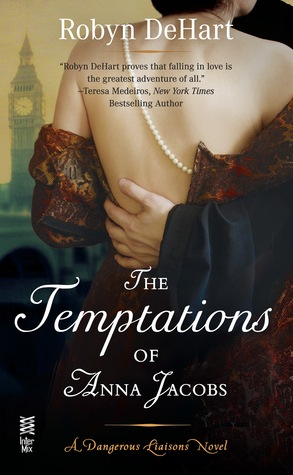 Nabbed on Netgalley because it reminds me of the recent Mary Hart Perry book, The Shadow Princess, The Temptations of Anna Jacobs by Robyn DeHart is on my kindle. It seems I cannot resist books featuring women going after the Ripper.
Nabbed on Netgalley because it reminds me of the recent Mary Hart Perry book, The Shadow Princess, The Temptations of Anna Jacobs by Robyn DeHart is on my kindle. It seems I cannot resist books featuring women going after the Ripper.When Drew Foster is released from prison, he doesn't much care about salvaging his soiled reputation. Though he's working undercover, everyone in Victorian London believes him guilty of the Jack the Ripper murders and that his brother paid for his "innocence."
Despite her genteel upbringing, Anna Jacobs is intent on finishing medical school and becoming a physician. Society's ridicule has never bothered her, but when her brother, the Yard's best detective, is scorned for letting Drew go, she confronts the one man who can set the record straight at a ball. She certainly doesn't count on the rogue being dashing and handsome, nor on him stealing a passionate kiss.
Anna's brazen contempt for his dangerous reputation captivates Drew, but he is harboring secrets that make him unfit to court any proper woman. As he finds himself an outsider among his colleagues at Scotland Yard, the feisty beauty offers up her medical knowledge to assist him on the case. But when the real killer returns to London to continue his reign of terror, can Anna find safety in Drew's arms?
***
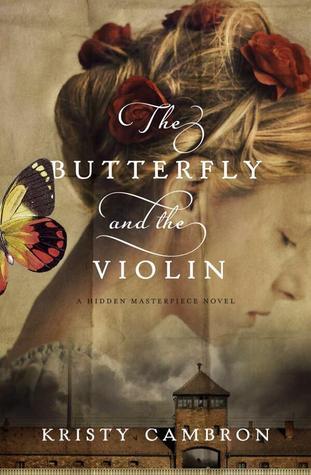 Spotted on NG. I'm not normally into strong religious themes, but this story is drawing me. The Butterfly and the Violin by Kristy Cambron.
Spotted on NG. I'm not normally into strong religious themes, but this story is drawing me. The Butterfly and the Violin by Kristy Cambron.And then came war . . .
"Today." Sera James spends most of her time arranging auctions for the art world's elite clientele. When her search to uncover an original portrait of an unknown Holocaust victim leads her to William Hanover III, they learn that this painting is much more than it seems.
"Vienna, 1942." Adele Von Bron has always known what was expected of her. As a prodigy of Vienna's vast musical heritage, this concert violinist intends to carry on her family's tradition and play with the Vienna Philharmonic. But when the Nazis learn that she helped smuggle Jews out of the city, Adele is taken from her promising future and thrust into the horrifying world of Auschwitz.
The veil of innocence is lifted to expose a shuddering presence of evil, and Adele realizes that her God-given gift is her only advantage; she must play. Becoming a member of the Women's Orchestra of Auschwitz, she fights for survival. Adele's barbed-wire walls begin to kill her hope as the months drag into nearly two years in the camp. With surprising courage against the backdrop of murder and despair, Adele finally confronts a question that has been tugging at her heart: Even in the midst of evil, can she find hope in worshipping God with her gift?
As Sera and William learn more about the subject of the mysterious portrait--Adele--they are reminded that whatever horrors one might face, God's faithfulness never falters.
***
 Spotted on Edelweiss and on my wishlist. You all know I can't resist a woman in aviation story. Bird's Eye View by Elinor Florence.
Spotted on Edelweiss and on my wishlist. You all know I can't resist a woman in aviation story. Bird's Eye View by Elinor Florence.Rose Jolliffe is an idealistic young Canadian when she joins the British Royal Air Force in World War II as an aerial photographic interpreter. Working with intelligence officers at the Danesfield mansion in England, Rose spies on the enemy from the sky, watching the war unfold through her magnifying glass. When her commanding officer, Gideon Fowler, spots potential in Rose, her prospects look bright. But can he be trusted? Rose's path is a painful one, paralleled by the progress of the war and Canada's emergence from Britain's shadow.
***
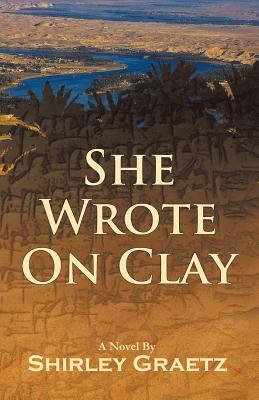 After reading a fascinating guest post from this author, I've added her book to my wishlist too. She Wrote on Clay by Shirley Graetz.
After reading a fascinating guest post from this author, I've added her book to my wishlist too. She Wrote on Clay by Shirley Graetz.3,800 years ago, in the city of Sippar, on the banks of the Euphrates, lltani dreams of becoming a female scribe, a profession dominated by men. In order to fulfill her destiny, she enters the gagu to become a nad tu, an elite class of monastic women. But life is not so simple and misfortunes threaten her goal. On the verge of despair, it takes all her strength to continue the difficult journey.
Published on March 29, 2014 00:00



